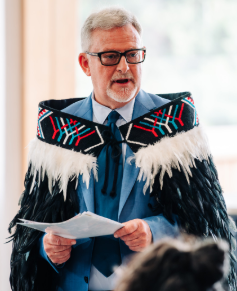News
89%: listen and learn from abuse survivors
11 Nov 25

89% of New Zealanders believe it is important to listen to and learn from the survivors who spoke out about abuse in state care.
New research conducted by Horizon Research also reveals that 74% of New Zealanders want to see the full implementation of the recommendations made by the Inquiry into Abuse in Care. The research was commissioned by the Human Rights Commission Te Kāhui Tika Tangata and released on November 11, a day ahead of National Day of Reflection on November 12, 2025.
The Royal Commission of Inquiry’s findings revealed: between 1950 and 1999, an estimated 200,000 children, young people, and vulnerable adults were abused in care, with cases continuing up to the present day. Nearly 3,000 survivors gave testimony of isolation, violence, and systemic failures that violated their fundamental human rights, the Human Rights Commission says.
Chief Commissioner Dr Stephen Rainbow says the Human Rights Commission exists to ensure governments do not abuse their powers, and this Inquiry highlighted some of the most egregious examples of such abuse.
“The Inquiry showed us that successive governments failed in this duty for decades. This day of reflection is about accountability and ensuring such abuses never happen again.”
Disability Rights Commissioner Prudence Walker says that the impacts identified by the inquiry leave lifelong consequences on nearly every aspect of survivors’ wellbeing.
“For many survivors, underlying social attitudes meant that they were seen as less valuable, and that the systems designed to protect them only harmed them.”
Huge majority agrees justice must be done
The Horizon polling data also revealed that 92% of New Zealanders believe everyone deserves the chance to live a good life and shape their own future, with 87% agreeing that justice must be done in response to the harm caused by abuse in care.
Given the overwhelming support for the Inquiry’s recommendations, Human Rights Commission’s Tatau Urutahi Tino Rangatiratanga leader Julia Whaipooti says this day of reflection must also be a turning point to honour survivors not just with words, but with action.
“The Royal Commission offered a pathway forward – one grounded in human rights and Te Tiriti o Waitangi. Its recommendations include establishing an independent, holistic redress system. There can be no chance for healing without meaningful redress and accountability.”
Despite apologies from government and faith-based institutions last year, progress on implementing the Inquiry’s recommendations has stalled, the Human Rights Commission says.
Survivors are still waiting for meaningful redress, and the Commission is also concerned by proposed legislation that could exclude some survivors from accessing redress based on past offending.
 “We stand with survivors. The Commission has a unique role in ensuring that survivors receive the justice and compensation that the Inquiry recommended,” says Dr Rainbow (pictured). “It is a priority for us to ensure that there is cross-party support for the redress that survivors deserve.”
“We stand with survivors. The Commission has a unique role in ensuring that survivors receive the justice and compensation that the Inquiry recommended,” says Dr Rainbow (pictured). “It is a priority for us to ensure that there is cross-party support for the redress that survivors deserve.”
“That’s why November 12 must be a day not only to remember but also to recommit to building a nation where human rights are upheld in every aspect of our society, including the critical right not to be tortured or treated cruelly.”
The Horizon Survey Report is here. Human Rights Commission comments are here.
HorizonPoll Online Survey system
and website developed by BEWEB
Copyright © 2010. HorizonPoll incorporating ShapeNZ - Listening to New Zealand


